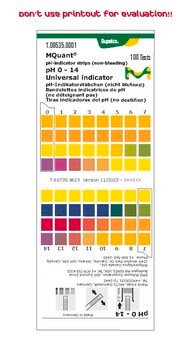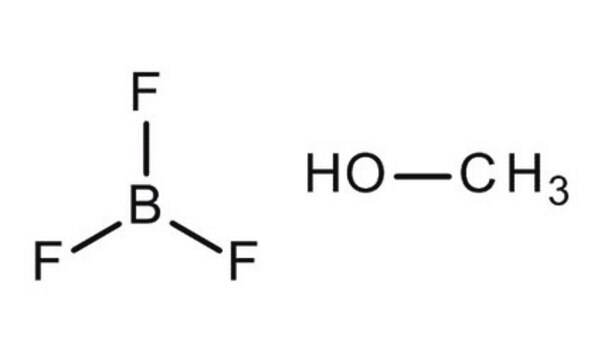1.11587
Potassium hydroxide solution
c(KOH) = 0.1 mol/l (0.1 N) in methanol, ready-to-use volumetric solution for titration for non-aqueous media, Titriplex®
Sinônimo(s):
KOH solution in methanol
About This Item
Produtos recomendados
Nome do produto
Potassium hydroxide solution in methanol, c(KOH) = 0.1 mol/l (0.1 N), Titripur®
Nível de qualidade
linha de produto
Titripur®
Formulário
liquid
temperatura de autoignição
455 °C (Methanol)
qualidade
Analyzed in our ISO 17025 accredited QC lab
Lim. expl.
5.5-44 % (v/v) Methanol)
adequação da reação
reaction type: Acid-base reactions
concentração
0.1 M
técnica(s)
titration: suitable
pH
13.5 (20 °C in H2O)
temperatura de transição
flash point 7 °C
densidade
0.80 g/cm3 at 20 °C
temperatura de armazenamento
15-25°C
Aplicação
- Snap-on Adaptor for Microtiter Plates to Enable Continuous-Flow Microfluidic Screening and Harvesting of Crystalline Materials: This study presents an innovative approach for microfluidic screening and harvesting, using a snap-on adapter for microtiter plates, enhancing the crystallization processes in research and development within pharmaceutical and material science applications (Coliaie et al., 2023).
- A Novel Sample Preparation Method Using Rapid Nonheated Saponification Method for the Determination of Cholesterol in Emulsified Foods: Discusses a novel technique involving potassium hydroxide in methanol for rapidly preparing samples to determine cholesterol levels in food products, beneficial for environmental testing and food safety (Jeong et al., 2012).
- Extended Release of Bevacizumab by Thermosensitive Biodegradable and Biocompatible Hydrogel: Research focusing on a biodegradable hydrogel for extended drug release, where potassium hydroxide in methanol plays a role in the hydrogel preparation, proving crucial in pharmaceutical applications (Wang et al., 2012).
- Spectrophotometric and Fluorimetric Determination of Diazepam, Bromazepam, and Clonazepam in Pharmaceutical and Urine Samples: This study utilizes potassium hydroxide in methanol for the enhanced spectrophotometric and fluorimetric analysis of benzodiazepines in clinical and forensic testing scenarios (Salem et al., 2004).
Características e benefícios
This volumetric solution is analyzed by our calibration laboratory D-K-15185-01-00 which is accredited according to DIN EN ISO/IEC 17025 for analysis of amount-of-substance concentrations in volumetric solutions by DAkkS (Deutsche Akkreditierungsstelle - German National Accreditation Body). The accreditation certificate can be found at www.sigmaaldrich.com/ISO17025.
Embalagem
Ligação
Nota de análise
Amount-of-substance concentration 0.0995 - 0.1005 mol/L
Measurement uncertainty ± 0.0003 mol/L
Traceability NIST SRM
The concentration is determined by volumetric titration and refers to 20°C.
The amount-of-substance concentration of this volumetric solution is traceable to a primary standard reference material (SRM) from the National Institute of Standards and Technology, Gaithersburg, USA (NIST SRM 84 potassium hydrogen phthalate) by means of volumetric standard potassium hydrogen phthalate (article number 1.02400), certified reference material according to ISO 17034, analyzed by our accredited calibration laboratory of Merck KGaA, Darmstadt, Germany according to DIN EN ISO/IEC 17025. The uncertainty is expressed as expanded measurement uncertainty with a coverage factor k=2 covering a confidence level of 95%.
Note: The titer is a correction factor to correct for variations of the volumetric solution, the titration equipment, the temperature and other laboratory conditions. For correct titration results it is recommended to determine a titer with the laboratory specific equipment and under laboratory specific conditions directly after opening a new bottle and at regular time intervals.
Informações legais
produto relacionado
Palavra indicadora
Danger
Frases de perigo
Declarações de precaução
Classificações de perigo
Acute Tox. 3 Dermal - Acute Tox. 3 Inhalation - Acute Tox. 3 Oral - Eye Irrit. 2 - Flam. Liq. 2 - Met. Corr. 1 - Skin Irrit. 2 - STOT SE 1
Código de classe de armazenamento
3 - Flammable liquids
Classe de risco de água (WGK)
WGK 2
Ponto de fulgor (°F)
44.6 °F
Ponto de fulgor (°C)
7 °C
Certificados de análise (COA)
Busque Certificados de análise (COA) digitando o Número do Lote do produto. Os números de lote e remessa podem ser encontrados no rótulo de um produto após a palavra “Lot” ou “Batch”.
Já possui este produto?
Encontre a documentação dos produtos que você adquiriu recentemente na biblioteca de documentos.
Os clientes também visualizaram
Nossa equipe de cientistas tem experiência em todas as áreas de pesquisa, incluindo Life Sciences, ciência de materiais, síntese química, cromatografia, química analítica e muitas outras.
Entre em contato com a assistência técnica










